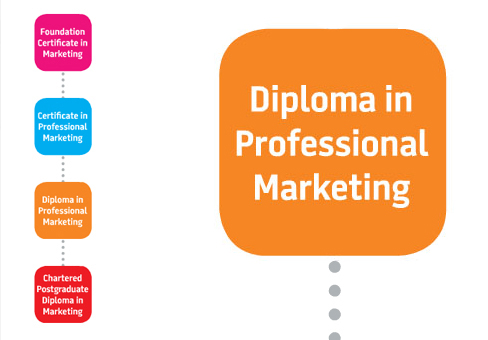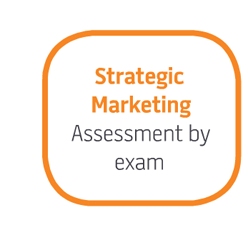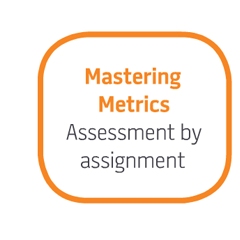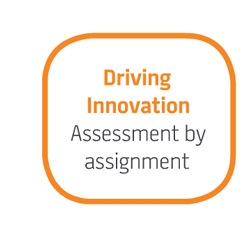Why I chose the new CIM Diploma in Professional Marketing

 Over the last couple of months CIM in London has published a helpful overview of the new CIM qualifications. Now we turn our attention to the new Diploma in Professional Marketing, and share the views of two recently qualified marketers, Marc Wilcox and Adam Jones. This report will be of interest to senior marketers who may not be as familiar with the new qualifications as their marketing teams, as well as those starting out in their marketing careers.
Over the last couple of months CIM in London has published a helpful overview of the new CIM qualifications. Now we turn our attention to the new Diploma in Professional Marketing, and share the views of two recently qualified marketers, Marc Wilcox and Adam Jones. This report will be of interest to senior marketers who may not be as familiar with the new qualifications as their marketing teams, as well as those starting out in their marketing careers.
This handy overview is brought to you by Jon Twomey of the Student Support Group. This is the London organisation behind the free helpline sponsored by CIM’s Greater London Region Board which provides advice to studying members in the capital on 01784 463057. The Student Support Group is a CIM Accredited Study Centre. To date it’s helped over 20,000 marketers gain their qualifications.
It’s worth noting that the new CIM qualifications have been welcomed by employers, with CIM qualifications being a key factor in their job adverts. Many leading Universities have lined up behind the qualifications and joined CIM’s Graduate Gateway scheme.
To date Jon has reported on:
Focus on the CIM Diploma in Professional Marketing
In the news this time, Jon explains more about the CIM Diploma in Professional Marketing including who will benefit from the qualification, how its structured, what each module covers and how it’s all assessed. Marketers, Marc Wilcox and Adam Jones who have just completed this qualification provide their views to give you a real life perspective.
Who is it designed for?
The CIM Level 6 Diploma in Professional Marketing is aimed at the professional marketer working in an operational, supervisory or management role who wishes to develop their knowledge and skills across a range of areas to succeed and progress their career in marketing.
Mark Wilcox explains why it’s worthwhile
 “I finished university with a degree in media and journalism and fell into a marketing and communications internship. After completing the internship, I decided that I really enjoyed it and I wanted to pursue a formal qualification to develop my understanding of marketing theory. A friend of mine, who already worked in marketing, recommended CIM to me. After further research, I decided to undertake the Professional Diploma in Marketing as it offered a broad, in-depth theory around marketing and I felt this would really improve my job prospects and aid my transition into a marketing career.
“I finished university with a degree in media and journalism and fell into a marketing and communications internship. After completing the internship, I decided that I really enjoyed it and I wanted to pursue a formal qualification to develop my understanding of marketing theory. A friend of mine, who already worked in marketing, recommended CIM to me. After further research, I decided to undertake the Professional Diploma in Marketing as it offered a broad, in-depth theory around marketing and I felt this would really improve my job prospects and aid my transition into a marketing career.
At first I thought I had bitten off more than I could chew, but The Student Support Group had really professional, knowledgeable tutors who helped me understand how to tackle the modules. I eventually completed the course with some great results along the way. It has definitely improved my overall knowledge of marketing theory, as well as enhancing my CV and giving my confidence a big boost.”
Adam Jones on studying and its payback
 “I was a Marketing Manager at an SME with six years' experience behind me and wanted to expand my skillset to progress my career. My role was overwhelmingly comms-based, so consolidating my knowledge across the marketing mix, particularly regarding strategic and commercial fundamentals, was key. The CIM Professional Diploma was the obvious choice: CIM is an internationally respected, leading contributor to the global marketing conversation and the Professional Diploma is acknowledged as the benchmark course across the industry.
“I was a Marketing Manager at an SME with six years' experience behind me and wanted to expand my skillset to progress my career. My role was overwhelmingly comms-based, so consolidating my knowledge across the marketing mix, particularly regarding strategic and commercial fundamentals, was key. The CIM Professional Diploma was the obvious choice: CIM is an internationally respected, leading contributor to the global marketing conversation and the Professional Diploma is acknowledged as the benchmark course across the industry.
Two modules in I had already progressed in my career, securing a contract for top 100 global brand and the world's biggest pay TV broadcaster Discovery Networks. Shortly after completing the qualification, my potential and abilities were recognised and I was employed permanently as the marketing lead across MEA. The knowledge gained through the course has increased my confidence, authority and ability as a 360° marketer, while having the qualification under my belt has increased the respect and consultation I receive from senior management.
I enlisted the help of SSG after being unhappy with the marks I was achieving. Caroline, Jon and the team give that invaluable push when you feel you've done about as well as you think you can, recognising when you can do better by your own abilities. The SSG feedback was very comprehensive and gave me the confidence and direction I needed to obtain a 68% and a 74% for the two modules I worked on under their guidance.”
Entry requirements
To gain entry onto this qualification you’ll need at least one of the following:
- CIM Level 4 Professional Certificate in Marketing; any relevant Level 4 qualification
- Foundation Degree in Business with Marketing
- Bachelor’s or Master’s degree from a recognised university, with at least one third of credits coming from marketing content (i.e. 120 credits in Bachelor's degrees or 60 credits with Master's degrees)
- professional practice (suggested two years marketing in an operational role) and diagnostic assessment onto Level 6.
Successful achievement of the Level 6 Diploma in Professional Marketing will establish the knowledge, skills and understanding to be able to perform at a management level and to carry out an essential and successful professional marketing role within the workplace. It will allow progression onto the CIM Level 7 Chartered Postgraduate Diploma in Marketing.
How many modules are there?
To achieve the CIM Level 6 Diploma, entails completing three modules.
- Strategic Marketing
- Mastering Metric
- Driving Innovation OR Digital Strategy
You’ll need to pass BOTH mandatory modules plus ONE elective module. You can study these in any order, though Jon recommends doing Strategic Marketing first if you can, followed by Mastering Metrics and then one (only) of the optional/elective modules. Each bite-sized module is an award in its own right, so you can spread out the study (and the costs) and study for one module at a time and build up to the full Diploma qualification later.

 Strategic Marketing (mandatory)
Strategic Marketing (mandatory)
 This module will give you an insight into marketing concepts and tools and how these are applied to deliver results.
This module will give you an insight into marketing concepts and tools and how these are applied to deliver results.
What will I learn from this module?
Learning Outcomes - Upon completion of studies, module students should be able to:
Situational analysis (30%)
- Understand how to analyse an organisation’s current and future external environment
- Understand how to analyse an organisation’s current and future internal environment
Planning (40%)
- Analyse relevant information to recommend and inform strategic decision making
- Develop a strategic marketing plan to realise organisational objectives
Implementation and control (30%)
- Manage resources to deliver the strategic marketing plan
- Monitor, measure and adapt the marketing plan for continuous improvement
It is interesting to note the CIM command/action words typically used at Diploma level focus on these skills with reference to CIM recognised theory of course:
- Analyse
- Develop
- Manage
- Monitor
How is the Strategic Marketing module assessed?
This module is assessed via an external examination comprising an extended answer test in a three-hour controlled assessment. Preparatory work will be required for this examination.
SAMPLE Assessment
Strategic Marketing assessment comprises TWO compulsory tasks:
Task 1 – Prepared organisation summary (up to ONE page) and marketing plan (up to EIGHT pages) to be taken into the examination. This preparatory brief should be used to produce an organisation summary and preparatory marketing plan which will be required as part of the overall assessment (40 marks)
Task 2 – Examination: Strategic Marketing examination based on the marketing plan and whole syllabus. The examination will be 3 hours in duration. (60 marks)
Mastering Metrics (mandatory)
 Marketers are faced with an increasing volume and range of marketing data, innovative methods of analysis and new measures of marketing effectiveness. This module will equip you with the ability to selectively analyse different sets of marketing data for insight, and to undertake effective decision making in relation to the utilisation of marketing resources.
Marketers are faced with an increasing volume and range of marketing data, innovative methods of analysis and new measures of marketing effectiveness. This module will equip you with the ability to selectively analyse different sets of marketing data for insight, and to undertake effective decision making in relation to the utilisation of marketing resources.
What will I learn from this module?
Learning Outcomes -Upon completion of studies, module students should be able to:
Metrics and analytics (25%)
- Understand the role of marketing metrics
- Understand the significance of different measurement techniques across a range of market contexts
Measuring effectiveness (35%)
- Know the relevant measures of marketing performance
- Apply marketing metrics to establish the effectiveness of marketing activities
Analytics for decision making (40%)
- Understand appropriate sources of data for marketing analysis
- Utilise various analytics tools and techniques for marketing insight and strategic decision making
How is the Mastering Metrics module assessed?
This module is assessed via an external assessment with a 12-page assignment based on a given scenario and an organisation of choice. The assignment consists of three tasks.
Sample Assessment - TASK ONE
Total – 20 marks. Maximum page count – 4 pages
a) Using the organisation summary guidelines, provide a background to your chosen organisation. This section should be placed at the end of your report. (5 marks)
b) Identify and explain the role of marketing metrics in the context of marketing and the process of making marketing decisions in your chosen organisation. You should refer to relevant theory within this subtask. (5 marks)
c) Describe the relationship between marketing and the other business functions in your chosen organisation. (5 marks)
d) Explain how marketing metrics are currently utilised in your chosen organisation. You should be able to demonstrate how the metrics are applied. (5 marks)
Driving Innovation(elective)
 This module outlines the importance of how taking a visionary approach, and embedding innovation, can help organisations deal with the challenges of a fast-moving marketplace. It focuses on how an understanding of the relationship between marketing and entrepreneurship can enable organisations to deliver compelling marketing solutions. It presents the key factors in building and nurturing innovation throughout the organisation and within the marketing function. It provides an appreciation of the role of internal marketing in supporting a culture of innovation and in implementing change programmes.
This module outlines the importance of how taking a visionary approach, and embedding innovation, can help organisations deal with the challenges of a fast-moving marketplace. It focuses on how an understanding of the relationship between marketing and entrepreneurship can enable organisations to deliver compelling marketing solutions. It presents the key factors in building and nurturing innovation throughout the organisation and within the marketing function. It provides an appreciation of the role of internal marketing in supporting a culture of innovation and in implementing change programmes.
What will I learn from this module?
Learning Outcomes - Upon completion of studies, module students should be able to:
Entrepreneurial marketing (30%)
- Understand the relationship between marketing and entrepreneurship
- Implement an entrepreneurial response to change and to delivering marketing solutions
Innovation (30%)
- Understand the key factors that facilitate and nurture innovation in organisations
- Apply principles of innovation throughout the marketing function
The marketing champion (40%)
- Understand the role of internal marketing
- Implement marketing-led organisational change
How is the Driving Innovation module assessed?
This module is evaluated via an external assessment with a 15-page assignment based on a given scenario and an organisation of choice. The assignment consists of three tasks.
Sample Assessment – TASK ONE
Total – 40 marks. Maximum page count – 8 pages
You have been asked to write a report on how your organisation, or a suitable organisation with which you are familiar, responds to technology-driven change. Your report should be aimed at senior management and supported with robust data & information on the organisation and its external environment. Required:
a) Using the organisation summary guidelines, provide a background to your chosen organisation. This section should be placed at the end of your report. (5 marks)
b) Identify and assess an area of new technology that is currently driving change around the creation of new products or services in your chosen organisation. Outline the context of this change, considering factors such as the scope and urgency of the change required. (7 marks)
c) Evaluate the extent to which your chosen organisation’s current marketing approaches will be appropriate in developing the organisation’s response to the area of new technology identified in part 1b above. Compare and contrast these marketing approaches with those of at least two other organisations that operate successfully in business contexts different to that of your chosen organisation. (10 marks)
d) Recommend, based on your findings, how your chosen organisation can respond in a more entrepreneurial way to the new technology – for example, through more efficient use of marketing resources, a more entrepreneurial approach to new product and service development processes, or new types/forms of business models. (12 marks)
e) Explain how the changes you are recommending should be communicated to other parts of the organisation and to wider stakeholders, such as suppliers and customers. Identify one key internal group and illustrate how new media can be used to reach this segment. (6 marks)
Digital Strategy (elective)
 This module provides insight into how organisations can implement digital marketing capabilities into strategic marketing planning. It outlines how an understanding and analysis of the macro- and micro-environments can enable organisations to assess the impact of the disruptive digital landscape in delivering objectives, in order to develop strategic recommendations. It provides recognition of how creating digital marketing mixes can enable organisations to respond with agility to market needs. It examines how the management of digital channels and the application of key digital measures help to achieve business objectives.
This module provides insight into how organisations can implement digital marketing capabilities into strategic marketing planning. It outlines how an understanding and analysis of the macro- and micro-environments can enable organisations to assess the impact of the disruptive digital landscape in delivering objectives, in order to develop strategic recommendations. It provides recognition of how creating digital marketing mixes can enable organisations to respond with agility to market needs. It examines how the management of digital channels and the application of key digital measures help to achieve business objectives.
What will I learn from this module?
Learning Outcomes - Upon completion of studies, module students should be able to:
Digital disruption (30%)
- Understand the strategic implications of the disruptive digital environment
- Generate relevant insights into key emerging themes within the digital marketing environment
Digital planning (40%)
- Develop strategic recommendations in response to the need to acquire, convert and retain customers
- Deliver an agile response to changing customer behaviours
Delivering success (30%)
- Know how to manage and optimise key channels and content within a digitally enhanced strategic plan
- Apply key digital measures to analyse social, sentiment, search and site behaviour
How is the Digital Strategy module assessed?
This module is evaluated via an external assessment with a 17-page assignment based on a given scenario and an organisation of choice. The assignment consists of three tasks.
SAMPLE Assessment – TASK ONE
Total –15 marks. Organisation summary recommended page count limit 1 page; Tasks 1 b to c recommended page count limit –2 pages.
Write a briefing paper for the senior management of your chosen organisation. The briefing paper should provide the reader with an understanding of conversion rate optimisation (CRO) as a digital marketing concept, as well as providing recommendations as to how developments in this area can be monitored. Required:
a) Using the organisation guidelines, provide a background to your chosen organisation (5marks)
b) Explain the purpose and benefits of CRO. (5marks)
c) Recommend how future developments in CRO practice can be monitored and reported throughout the chosen organisation. (5marks)
How long will it take me to get qualified?
Each module has been calculated as carrying 15 credits which equates to around 130-150 notional learning hours. This includes: tutor guided learning hours; practical and work-based learning; assessment preparation time; and assessment time.
When are the assessments delivered?
There are three assessment sessions per year. These take place at the end of March/early April, and end of June and early December each year. Please see the CIM Learning Zone for exact dates.
What’s next after this?
Having completed the CIM Diploma in Professional Marketing you could consider the CIM Professional Postgraduate Diploma in Marketing which is a level 7 qualification.
Any questions?
If you have any questions, please contact one of our CIM training and qualification advisors at qualifications@cim.co.uk.
You can call the Student Support Group advice helpline which is free for CIM members in the Greater London region. The group also provides a range of help with assignments and exams, fees apply to some services.
Contact caroline@studentsupportgroup.co.uk or call Caroline on 01784 463057

